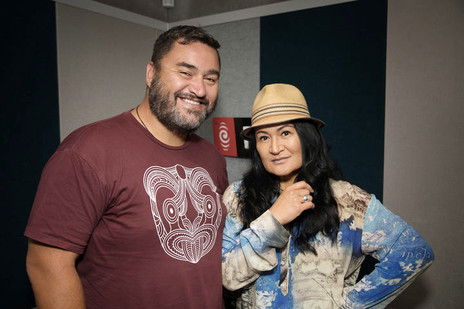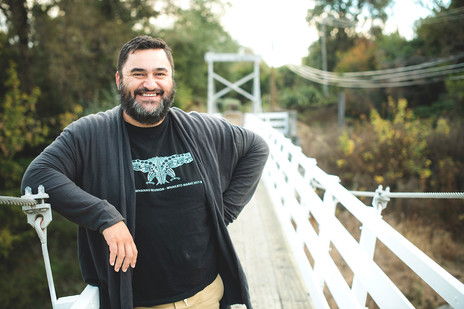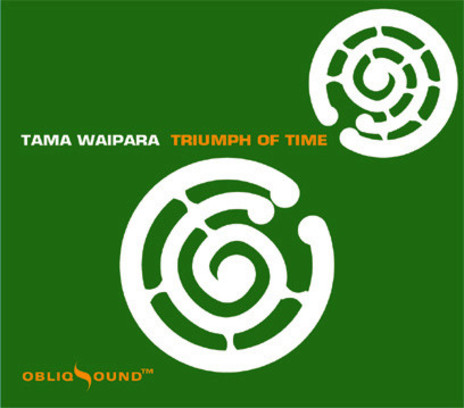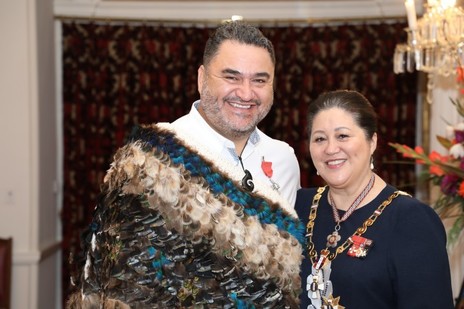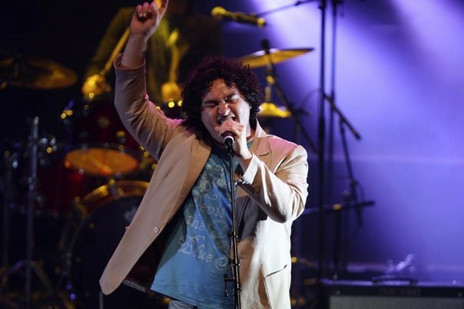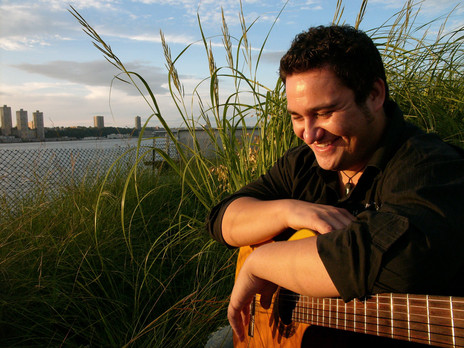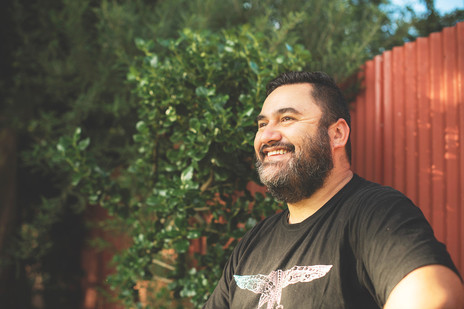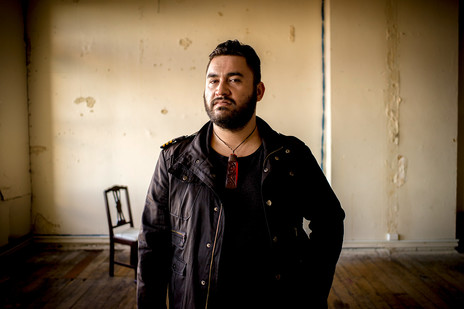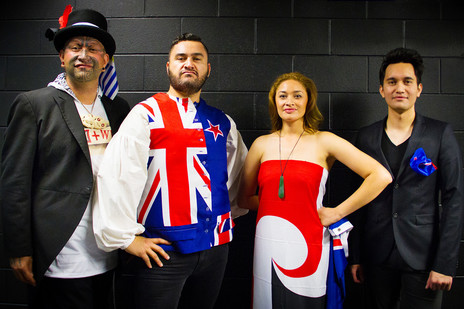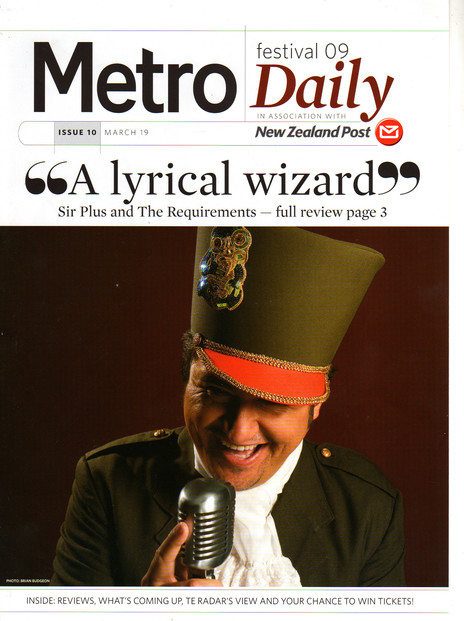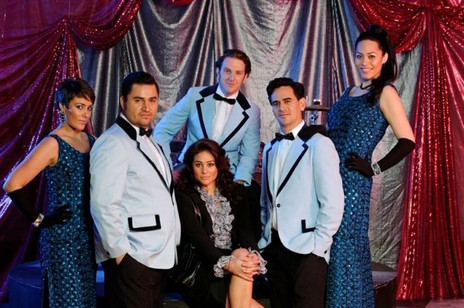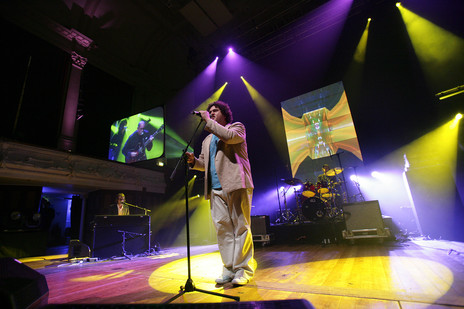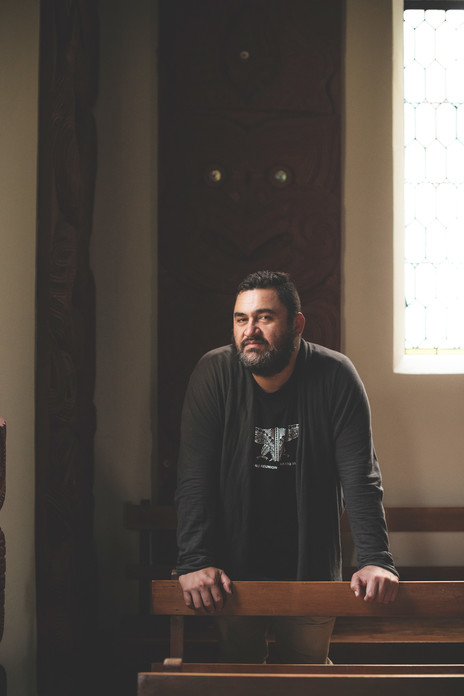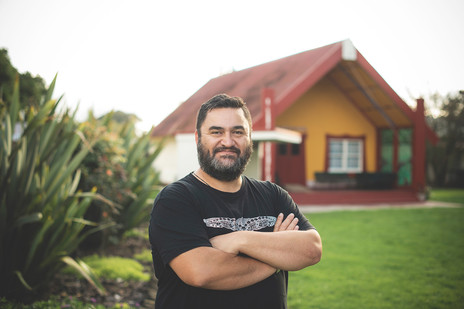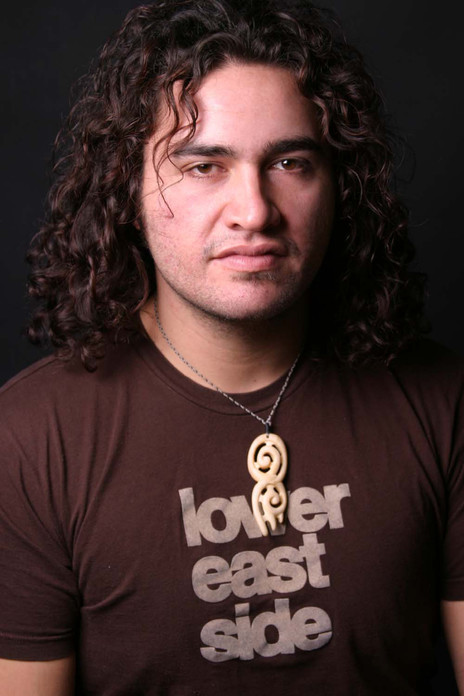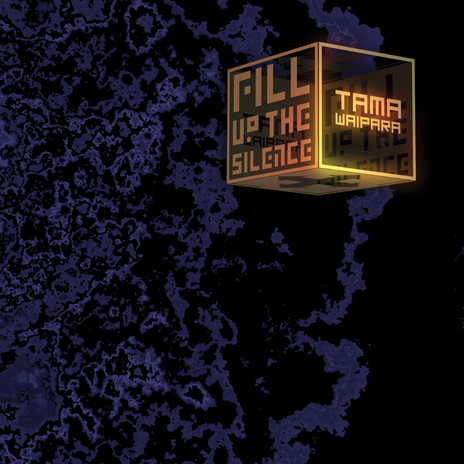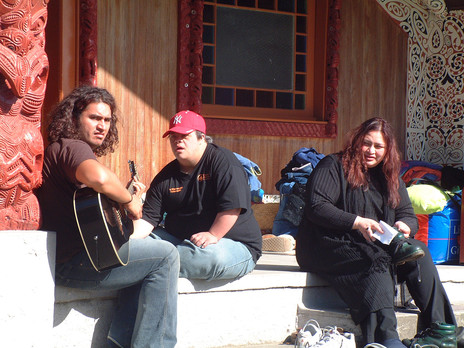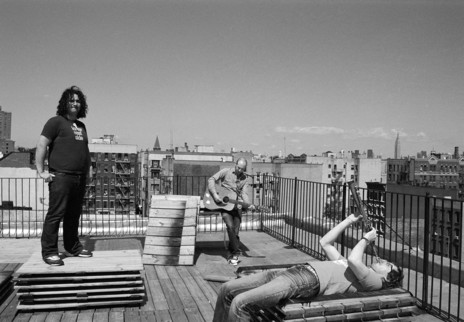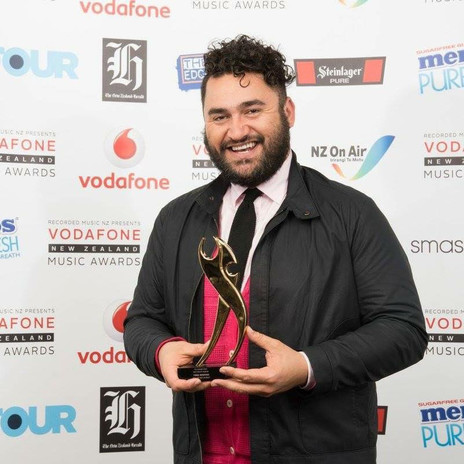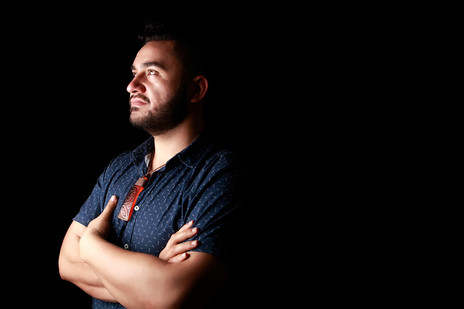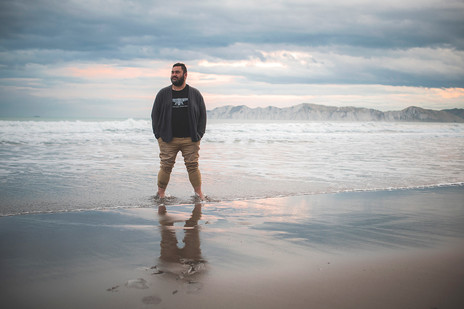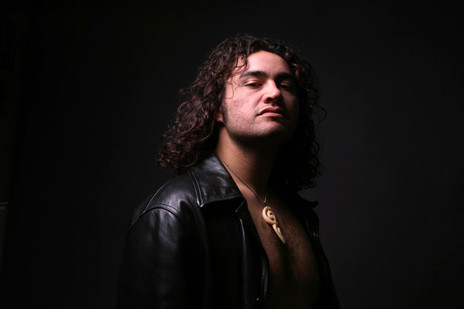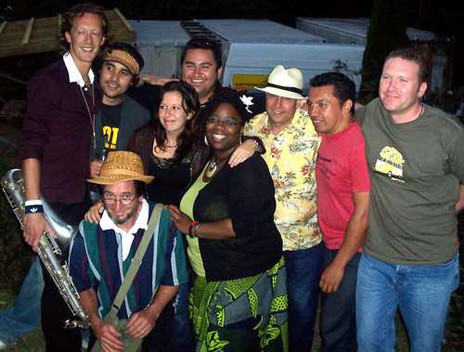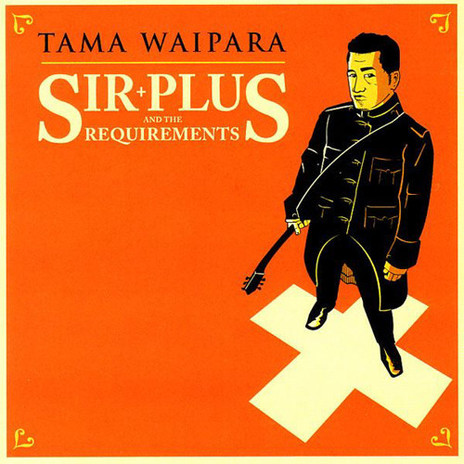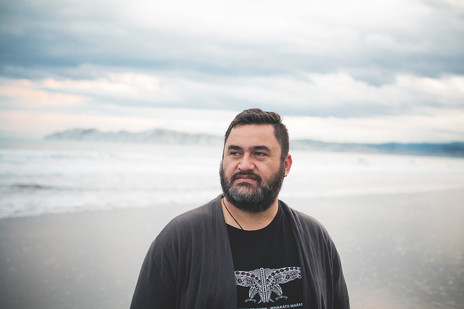When Tama Waipara (Ruapani, Rongowhakaata, Ngāti Porou) started clarinet lessons at age 10, he was following his parents’ influence. His mother was a classical flautist who went on to teach the instrument, while his father is a guitar player with a knack for picking up songs on first listen.
Waipara’s early years were spent in his mother’s hometown of Christchurch (his dad was from Manutuke), but they later moved to Ōpōtiki (closer to his dad’s home of Manutuke). This small town had few opportunities for a clarinet player so he moved to Auckland and enrolled in a Bachelor of Music degree.
While his focus remained on the clarinet, at the encouragement of lecturer Karen Grylls he joined the Auckland University Choir and was able to develop his singing. At one public lecture, Waipara found himself seated behind the singer Mahinaarangi Tocker who noticed that he had a clarinet case. Without even hearing him play, she asked him to record on her next album and soon found himself in the studio with Tocker and her producer, Shona Laing.
An article about Waipara caught the eye of television presenter Pio Terei, who invited him to perform on his show, Pio’s Place. Initially it was going to be an instrumental performance on clarinet of a Nina Simone song. However, Waipara left the CD at home by mistake. This meant that at rehearsal he had to sing the track to describe how it should go and when Pio heard his voice, he insisted that Waipara should sing a few verses too.
A change of direction
When Waipara completed his BMus, he flew to the US to audition for the Manhattan School Of Music In New York.
“I came back to New Zealand thinking that there’s no way I could have got in," he says. “It is a tough situation – you travel 10,000 miles, then you have 10 minutes to prove your worth. The year I tried out, they only took two people out of 360 applicants. Afterwards, I just went home and got on with life. I was doing a gig with the Auckland Youth Orchestra when I got a call from my brother saying an envelope had arrived for me from the Manhattan School. I told him he should just throw it in the bin, because it was probably a rejection letter. But he asked if he could open it and it turned out that I’d been accepted!”
Waipara made it to Manhattan but nine months later tragedy struck.
The course in New York was expensive, so Waipara organised a fundraising concert. Mahinaarangi Tocker agreed to perform as a way to repay him for his contribution to her album. The event was the first time Waipara performed a song he’d written in front of an audience, even if he now finds the fledgling composition to be quite embarrassing. In the end, he was just glad to find that “if people in New Zealand say they are going to help you, they help you all the way”.
Waipara made it to Manhattan and was nine months into the course when tragedy struck. He had a job looking after new arrivals to the music school and was sitting outside the student accommodation to greet them, when a loose fuse box fell from inside his building and struck him on the head. He was covered in blood but managed to walk to the hospital where he was told to wait until a doctor could see him. After two hours, he collapsed onto the floor and finally received medical attention:
“I was in the ICU for a couple of nights because they thought I might’ve had an aneurysm. I ended up staying there for almost two weeks. From then on, I had post-traumatic migraine and every time I tried to play clarinet it led to blackouts and vomiting. Having never had a migraine I always thought ‘have a Panadol and get over it’. But now I’ve experienced a real migraine, I realise it is really not nice at all.”
It became clear that he wasn’t going to be able to audition for an orchestra and he would have to find another way to stay creative. He switched over to singing and joined a few jazz bands from his school. Eventually he and a few friends decided to start their own band, The Occasions:
“It was meant to be a piss-take on wedding bands, but instead of playing covers of old funk tunes, we were generating new work. There was an amazing set of people in that group. The keyboard player was a writer for the New York Times, the guitarist was a folk singer-songwriter, and the drummer was doing his masters in tuba. The drummer was Kim Thompson, who is this unbelievable talent from St Louis – she’s a female drummer which is unusual enough, but she also happens to be one of the greatest drummers in the country.”
Waipara was in New York on 11 September 2001, when the World Trade Center was brought down by terrorists. He reconsidered where he was going with his music and wondered if his future might actually be back in Aotearoa, rather than the US. However there was a degree to finish first; 10 months after the accident his migraine had diminished, so he was able to start playing clarinet once more.
He began performing with orchestras and chamber music ensembles at venues including Carnegie Hall, while keeping his singing up on the side. He found that New York was a very inspiring place to be at that time.
“You can see any kind of music – the range of which can be from awful to exquisite on the same night. You might even see all facets of it in the same venue. At one gig, there might be pretentious art music, then a folk artist, then an indie band. Then I’d turn up and play!”
Waipara was feeling torn about which musical path to follow.
The Occasions were approached by producer Joshua Thompson – known for his work with Alicia Keys – and he suggested recording a demo to take to labels. However, Waipara was feeling torn about which musical path to follow.
“It was starting to turn into R’n’B and I started thinking ‘this is not really me’. Having been surrounded in New York by the roots of Black American music – jazz, R&B, and real soul – it felt false to be peddling something that wasn’t mine ... I made the decision to come home and was about to buy a ticket when I got a call from a producer who’d been to one of the shows. He was from a small indie label called ObliqSound, which was just being launched with the release of a sampler CD and they wanted me to do one track. I was like – ‘Someone’s gonna pay me to sing? Great!’ So I did one session with them, not expecting that it would go anywhere.”
The producer who approached Waipara was Italian expat Michele Locatelli, who had worked at the Verve label and subsequently started his own label, ObliqSound. At this point, Waipara was still finding his feet as a songwriter so when they went into the studio to record, it was often Locatelli and label co-owner Ralf Schmid who came up with the music ideas.
The first time they worked together, they suggested writing a song based on a poem by AC Swinburne. The original text was shortened to song length and Waipara sang it over a backing of jazzy chords played on an organ and a busy rhythmic underpinning provided by percussionist Tony Devivo (with horns and a choir of singers appearing towards the end).
ObliqSound were impressed with the track and offered Waipara a deal. This led to his debut album, Triumph of Time (2004), which mixed poetry from AC Swinburne and Shakespeare with ideas Waipara brought in from his own Māori heritage. It also gave him the chance to play a bit of clarinet. The title referred to the idea that these inspirations drawn from history were good enough to last.
Waipara then toured the album through Europe, the UK, and the US, including a slot at New York’s Central Park SummerStage. His label had a strong support base in Germany, so he relocated to Munich for a few years, though he visited New York often.
Returning To Paradise
In 2006, Waipara finally made the decision to return home. His contract with ObliqSound had come to an end and he found himself drawn to working back in his homeland.
“You do start to wonder what the point of singing songs about east coast sunrises is when you’re in New York. That’s not to say that the audiences there don’t get something from that, but I was just hanging out to be writing music back home.”
He was soon kept busy with a wide range of work. He wrote music for the sell-out play Based on Auckland, provided a soundtrack for the ESPN/PBS feature Polynesian Power, which aired in the US, and sang a cover, ‘Kiwi’, for the Dr Hirini Melbourne tribute album, He Rangi Paihuarere (2006).
Waipara connected with internationally successful local saxophonist Nathan Haines to play a set of live shows that included a sold-out performance at the Auckland Festival (AK07). He and Haines recorded together, with Waipara appearing on two tracks on Haines’s album Right Now (2007) and Haines playing on Waipara’s track ‘Morning Sun’ – a song that seemed to tap into Waipara’s desire for a change in direction. “I’m not sure of the road in front of me / but it’s better than the one I was on.”
The song came from Waipara’s 2007 EP, Leaving Paradise. The producer was another expat New Zealander, Aaron Nevezie, who lived in New York and played guitar with Waipara for his first solo gig in 2003 at popular NYC venue The Knitting Factory.
Waipara spent two days in New York recording his vocals with the core band of Nevezie (guitars), Dave Mason (drums), and John Davis (bass). Aside from Nathan Haines, there were also appearances on the EP from skilled local keyboardist Godfrey De Grut (keyboards) and on-the-rise NY singer, Emily King.
Waipara was ready to undertake a full album of his own songs.
The resulting six-song collection allowed Waipara to express himself directly rather than rely on the words of others. He considers it to be his first true solo release. The following year, Waipara released a new song ‘Where I Go’ and Haines helped out by doing a remix of the track, with another remix provided by Mark de Clive-Lowe. This led to a club hit in Austria, which came as quite a surprise to Waipara when the royalties finally trickled back to him.
Waipara’s confidence had now grown to the point where he was ready to undertake a full album of his own songs. He brought Justyn Pilbrow on board to produce it at Stebbing Recording Studio in Auckland. Pilbrow, a former member of Elemeno P, was on his way to creating a career for himself in the US and working with US Top 20 act, The Neighbourhood.
Waipara realised that he had a number of song ideas that were considered too poppy by the producers at ObliqSound, so decided to use them as the kicking off point for a new collection that would be more direct and catchy. He created a character to front the songs, so he could write from a different viewpoint – an introvert who finds his true home on the stage. This led to the album title, Sir Plus and the Requirements (2009), presented as the work of a fictional band similar to Sgt. Pepper’s Lonely Hearts Club Band.
The musicians on the album were some of the top players on the local scene: keyboardist Godfrey De Grut, bassist Chip Matthews, guitarist Dan Sperber, drummer Graham Cope and a string quartet. (The quartet was comprised of former Auckland University students and friends: Jess Hindin, Peau Halapua, Iselta Allison, and Mahuia Bridgman-Cooper, who led.) Reb Fountain added beautiful harmony vocals to the chorus of ‘You Don’t Have To Go’.
Waipara planned a musical spectacular to promote the album, with his four-piece band joined onstage by three backing singers and actress Morgana O'Reilly. The event was treated almost like a stage show, with special lighting and costumes created to add drama to the elements of comedy and theatre written into the performance. Waipara acknowledged that he was partly inspired by legendary Māori performers Prince Tui Teka and Billy T James, who saw themselves as all-round entertainers rather than just singers. Once again, Waipara was picked up by the Auckland Festival and managed to pack out his performance at the event.
Fill Up the Silence
It was four years until Waipara released his next album, but he was very busy during the intervening period. In 2010, he toured Aotearoa with Maisey Rika and they both went to the Netherlands to play as part of a contingent of ToiMāori Aotearoa artists in partnership with Museum Volkenkunde in Leiden. He would appear on three of Rika’s albums as a guest vocalist.
The following year he sang with the NZSO at the Town Hall and then, in 2012, took part in Brel: The Words and Music of Jacques Brel, a show created by Silo Theatre in 2012 and performed alongside Jon Toogood (Shihad) and Julia Deans.
Waipara had been pursuing music full time for over a decade, so he took the opportunity to give back to the next generation coming through. He started teaching clarinet at Auckland Girls Grammar and Mt Roskill Grammar, as well as mentoring young musicians in high schools as part of the NZ Music Commission programme.
Waipara decided he wanted to express his own perspective more fully on his next album. There would be no fictional element and he would draw inspiration from his upbringing in Ōpōtiki, whether it was from the music he was surrounded by or the wider culture.
It was perhaps a surprise that he decided to record such a locally grounded album in New York, but he was most comfortable at Bunker Studios with his old friend Nevezie, so set off with an album’s worth of song ideas already recorded in basic form. However, as he listened to his demos on the plane, he decided the singing on the demos was too measured and lifeless. He wanted some emotional rawness to be apparent in his voice, even if this meant leaving some notes slightly off-key or rhythms out of time.
Waipara wrote his first song in te reo Māori for the album: ‘Tangihia’.
When he arrived at the studio, they started again from scratch with the duties shared between them. Nevezie took up the guitar and bass, while Waipara provided piano. The pair co-wrote many of the prominent songs on the album, including singles ‘Medicine Man’ and ‘The Hunter’. The album was filled with deft rhythmic touches provided by Nevezie on bass and Dave Mason on drums. For example, the beat for ‘The Hunter’ is played mostly on roto-toms, while the bass inserts itself in stabs rather than playing a continual line.
Waipara wrote his first song in te reo Māori for the album, ‘Tangihia’, setting the words of Tweedie Waititi to music. Hinewehi Mohi was brought on board to provide harmonies. Another track, ‘Letter’, expresses that each person is a single point on a whakapapa that reaches back generations. The album ends with ‘Sunshine on the Water’ which simply has Waipara accompanying himself on guitar with a single harmony vocal and a piano part by Steph Brown towards the end.
The resulting album, Fill Up The Silence (2013), was a profound personal statement. Its power was recognised with the award for best roots album at the 2014 NZ Music Awards. This was a well-deserved accolade but the moniker of “roots” hardly covered the range of sounds on offer, from the 80s synth pop of ‘On The Wall’ to the atmospheric ballad ‘Stay Slow’ (with Emily King) and the near a capella ‘Pasifika’.
The album perfectly captured Waipara’s many talents as a songwriter, so it was a surprise when he put his musical career on the back burner soon afterward.
Changing Roles
Tama Waipara’s work within the local music industry continued over the following years, though he increasingly worked behind the scenes. His involvement in the APRA Silver Scroll Awards exemplifies this change – he performed at the 2013 and 2015 awards, then received the award for APRA best original music in a feature film in 2016 (for his work on Mahana with Mahuia Bridgman-Cooper), and by 2020 he was one of the judges of the Maioha Award.
Aside from the soundtrack mentioned above, Waipara created more new work over this time. Notably he created a soundscape for the Te Papa exhibition, Ko Rongowhakaata: The Story of Light and Shadow. The music was also used on an accompanying short film created by his brother Zak.
Waipara was also part of a choir that appeared on Neil Finn’s album, Out Of Silence (2017), recorded while being live-streamed to an international audience. He also contributed a track to the album Toitū Te Whenua (2019), put together by Maisey Rika to raise funds for the protest at Ihumātao.
Waipara’s biggest role in the creative sector is as a curator.
However, Waipara’s biggest role in the creative sector is as a curator. He began in 2012 as a programme manager for the Auckland Arts Festival (for Māori and Pacific content) and continued to work for the festival until 2019. His background in music meant he often looked for ways to put local artists in front of new audiences.
One example is the tribute show he put together celebrating the work of Mahinaarangi Tocker, who had such a crucial role in his own career. The show brought together a diverse range of singers, including Anika Moa, Nadia Reid, Shona Laing, Moana Maniapoto, Annie Crummer, Don McGlashan, Emma Paki, Maree Sheehan, Charlotte Yates, and Hinewehi Mohi. On another occasion he brought over his friend and collaborator Emily King to perform.
After leaving Auckland Festival, Waipara took up an equally important role starting in 2019 as the co-founder and CEO/artistic director for the Te Tairāwhiti Arts Festival in Gisborne.
He still releases music, notably the single ‘East Coast Moon’ featuring Maisey Rika, released to help raise people’s spirits in the midst of the Covid-19 lockdown in Aotearoa. The song was first written and performed in 2011 and recorded a few years later, so it took nine years to finally be released.
Waipara started work on new material around the same time. This time it was an international affair, with Waipara recording his parts at The Lab Recording Studio in Auckland, while Nevezie contributed from The Bunker in New York. Some sessions even took place at the same time, so they could record in synch. The fruits of this work are set to be released in 2021, so the fascinating story of Tama Waipara will soon have another chapter.
Waipara became a Member of the New Zealand Order of Merit in the 2024 New Year’s honours. In February 2024 it was announced that, from June, Dolina Wehipeihana and Tama Waipara were to become the festival co-directors at Tāwhiri, the creative force behind Aotearoa New Zealand Festival of the Arts, Wellington Jazz Festival, Lexus Song Quest, and Te Hui Ahurei Reo Māori o Te Whanganui-a-Tara.
